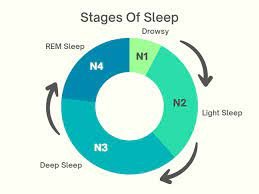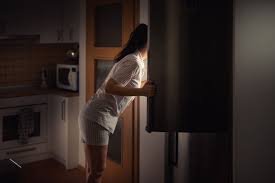Good Sleep For Good Health
Happi Healthi Yogi Here! Today we are talking about all things sleep. We all know that sleep is essential to a healthy routine, but sometimes we underestimate that getting quality sleep is just as important as the quantity of sleep. In a world that praises and often demands long hours and strenuous schedules, sleep is often the first thing sacrificed to meet those needs. The truth is, we need quality sleep for our mental, physical, and emotional well-being. In this blog, we will explore what it means to get a restful sleep, why it’s important, and some of the best ways to enhance your sleep quality with helpful tips to get optimal beauty sleep.
What Makes Sleep Restful Sleep?
Restful sleep is more than laying your head on your pillow and shooting for 8 hours. Like most things in life, it’s more complex. Quality sleep involves various stages and cycles, each necessary for restoring and refreshing your body and mind. Understanding the sleep cycle can help us explain how certain sleep disturbances like insomnia & sleep apnea can impact our sleep quality & overall health. The stages can be broken into two main types:
1). Rapid Eye Movement (REM) Sleep: If you’re like me, you weren’t quite sure what REM means, but just knew it was important for a good night's sleep. Mornings when you wake up reminiscing on crazy vivid dreams thinking ‘Woah that was crazy and felt too real’, that is your REM cycle. REM sleep is characterized by vivid dreams, increased brain activity, and, as the name suggests, rapid eye movement. REM sleep improves memory, learning, and emotional processing. Your brain is most active during this phase.
2). Non-Rapid Eye Movement (NREM): There are 3 NREM stages (N1, N2, and N3) that when coupled with one REM stage complete a full sleep cycle. This is the time your body repairs and regenerates tissues, and energy is restored. Of these three stages in NREM, N3 is the deepest stage and is the most crucial for restoration and growth in the body.
Quality night’s sleep requires cycling through these four phases multiple times throughout the night. Often when we wake up after 7 or more hours of sleep and are still tired and groggy, odds are there were disruptions in the cycle leading to incomplete restfulness.
If you’re like me, sleep is beyond crucial in order to be a functioning human. There are many things that can be considered ‘disrupters’ for optimal sleep hygiene. But, before diving into those, let’s always make sure we are realistic when it comes to shifting routines to achieve a health goal. Keeping an 80/20 mindset with sleep hygiene, just like you would with a food routine, is important for mentality. Life is all about balance. Allowing time for the fun things that might keep us out past our bedtime is just as important as prioritizing restful sleep for optimal health.
So What Hinders Our Sleep?
One way to track the restoration of our sleep is through our resting heart rate. The level of restoration is dependent on how long it takes your resting heart rate to stabilize during the night. A sign that a night’s sleep has a good restoration level is if your heart rate stabilizes in the first half of the night. You might be asking how you can track this for yourself – Oura ring is a great way to track sleep health. It is an investment, and I absolutely love mine, but the holidays are coming up if you are curious about it. Apple watches, Fitbit, and iPhone Apps all have these capabilities as well.
Whether you have a way to track your resting heart rate or not, these are some of the main offenders for disrupting our sleep:
1). Late Night Cravings: Sometimes, there’s really nothing better than a late-night indulgence after a night on the town. I get it! But when we eat right before bed, our body spends the night processing and digesting that 7th Street burger instead of reviving and regenerating energy for the next day. This is a big culprit for low restoration during sleep (our NREM phases).
2). Exercising Close to Bed: Everyone is different, and some people’s schedules or habits have them hitting the gym at the end of the day. Working out close to bedtime causes your heart rate to spike. Optimal restoration occurs when our heart rate goes below 60 bpm (beats per minute) within the first half of the night. Late-night exercise speeds up the metabolism, and therefore, your heart rate, making it difficult for stabilization early in the night.
3). Alcohol: A nightcap while it can be relaxing, is one of the main disrupters to our sleep cycle. Often, but not always, a late night is coupled with alcohol. A late night coupled with alcoholic beverages does a number on restoration and sleep quality. So again, the 80/20 rule applies. Have fun and be mindful. A balancing act we New Yorkers know all too well.
How To Improve Sleep Quality
Now that we know what a restful sleep cycle looks like, and what potential disrupters are, let’s talk about how we can enhance sleep so we can wake up on the right side of the bed.
There are supplements, foods, sleep mocktails, and breathing exercises that enhance the quality of our sleep and restoration.
1). Magnesium: I am a believer on this one 100%. Magnesium supplements are amazing at boosting the quality of zzz’s. It simultaneously relaxes the muscles, and nervous system, reducing anxiety and regulating our circadian rhythm. So run don’t walk with these. If supplements aren’t really your thing, our skin is the largest cell for absorption. Magnesium spray is another method for sleep. Liz Capone makes some of the best. It is called ‘Keep Calm, Spray On’ and let me tell you, it works! This spray helps with more than just sleep, so click the link below to test the benefits for yourself.
2). Sleep Mocktail: Switch over to this as your nightcap and watch your sleep drastically improve. The secret to this mocktail is tart cherry juice. Tart cherry juice contains natural melatonin and tryptophan which regulate and promote deeper sleep. Tart cherry juice also contains antioxidants, fights inflammation, reduces muscle soreness and boosts the immune system. Mix ½ a cup of tart cherry juice with a probiotic soda (Poppi, Bubly, Zevia) or soda water, and a squeeze of lime and you have the perfect sleepy-time mocktail. This is best to drink about an hour before bed for optimal results.
3). Legs Up the Wall: I do this every night and I swear by it. Right when you crawl into bed, put your legs up the wall with a slight bend at the knee. The goal is just to get your legs above your heart, so there is no right or wrong way to approach this. The goal is to sit like this for about 10 minutes. What this does is enhance circulation and decrease inflammation in your legs after a long day. The blood that is running from your legs goes to your stomach and heart, which helps digestion and circulation to the rest of the body. This is a great chance to practice some breathwork so you can sleep like a baby. Try it I promise it does wonders.
4). Keep a Consistent Sleep Schedule: Going to bed and waking up at the same time regularly will encourage your body to fall asleep more easily and feel less groggy the next day. Aligning your wake up with the sun also helps to promote a seamless sleep cycle and natural melatonin production.
5). Use Your Bed For its Purpose: The bed is used for 2 activities. When we work in our bed, take calls working from home in bed, eat in bed, write, paint, whatever it is you do – don’t do it in bed. Our body picks up on these habits and won’t relax as easily if we spend more time there than we need to. Think of it as a treat at the end of the day.
6). Breathwork: We talk a lot about meditation and its impact on our wellbeing. Doing a short breathwork exercise and mini meditation will slow down our heart rate and our nervous system making it easier to fall soundly asleep. Place one hand on your heart and one on your stomach, and focus on deep slow inhales and exhales. Breathe in for 4 seconds, hold 7, and breathe out for 7 seconds. Your mind will wander, just acknowledge those thoughts, then bring your focus back to your breath and find that calm Zen feeling.
7). Manage Our Stress: I know this is easier said than done. Some light stretching, meditation, breathwork, essential oils, hot shower, chamomile tea, and fluffy robes are some ways we can try to alleviate stress at the end of the day.
8). Limit Screentime at Bedtime: Blue light from our phones and TVs at night is a main disrupter of restful sleep. Blue light blocks the production of melatonin, so we are more likely to play the next episode because we aren’t tired. We want to feel drowsy at bedtime. So if you have to have something playing to go to bed, use blue light glasses, or just turn off the TV.
At the end of the day, good quality sleep is our biggest savior. Restful sleep can protect us from getting sick, improve our memory and problem-solving abilities, encourage a healthy mood, and naturally boost our energy. If you start to feel off in any way, mentally or physically, sleep is the first place you should turn to help improve how you feel. Your body naturally knows how to heal, we just need to give it the space and time to allow it to do its job. Trust your body, listen to your body, and watch your overall health improve. I hope this blog helped to shift perspective on sleep, why it’s important, and how we can achieve better sleep hygiene. So, tonight, make it a point to set the stage for a restful sleep and let your body and mind reap the rewards of a well-deserved slumber.
Namaste Friends.







